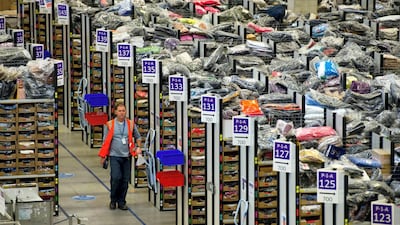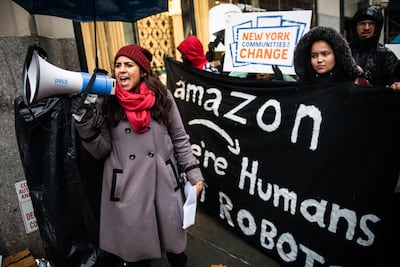There's a seasonal shopping rush underway in many parts of the word, with most gift purchases being done at the last minute. In such circumstances, it's not surprising that people instinctively turn to the company with the biggest stock of goods and a reputation for sending them out quickly: Amazon. Over its 25-year history, it has elicited a profound loyalty among consumers and a deep integration with their lives, and these things are spreading globally. In the UAE, the takeover and rebranding of Souq.com as Amazon.ae has given the firm a massive foothold in the Middle East. But there are concerns among businesses, governments and consumers that Amazon's ubiquity is far from healthy. A new American coalition, Athena, comprising over thirty groups, is now encouraging resistance to Amazon, which it views as a corporate bully. Yes, it may appear to be the consumer's friend, but its behaviour, they say, has pernicious long-term effects, which may not be immediately apparent.
Amazon chief executive, Jeff Bezos, considered naming his company "Relentless", and its growth has been just that. Once known for selling discounted books, it would come to dominate that market and systematically upturn countless others – technology, groceries, more recently moviemaking and industrial supplies. Earlier this decade, the firm was already being described as "something radically new in the history of American business", but today, it has a market value of more than $868 billion (Dh3,187bn), and Bezos is the richest person in the world. "I'm a writer, and so Amazon's relationship to the book market always concerned me," says Dania Rajendra, Athena's director. "But now I'm intensely focused on the harm it's doing through its size, its unchecked power and its business model."
That business model was never about becoming a big retailer. Bezos’s bold vision was to “become the market”; an e-commerce platform so dominant that every business felt they had to use it and every consumer felt drawn to it. According to a recent study of US consumer behaviour, nearly three-quarters of people go straight to Amazon to search for a product, rather than use a search engine. And it’s the company’s Prime service that has become the psychological key to that behaviour. Launched in the USA in 2005 at a cost of $99 per year, the membership guarantees free express shipping, making any online purchase seem cheaper and more convenient than any competitor. Half of American households now have Prime. It’s estimated, but not known, that Amazon makes billion-dollar losses on shipping, but it doesn’t care. It has people hooked.
This prompts the biggest question surrounding Amazon's dominance: if consumers are satisfied and they're getting goods at a price they're happy with, what's the problem? "There was a terrible idea developed in the 1980s, which was that consumer harm is the only standard for anti-monopoly and antitrust," says Rajendra. "Now there's a whole range of people addressing that error by returning anti-monopoly work to its pro-people roots." Athena's argument is that one dominant firm is bad even if prices aren't rising, because the effects of that dominance end up being felt in other ways: failure of small businesses, jobs being lost, lower product quality, falling wages and so on.
The classic example, according to Rajendra, is the story of diapers.com. After challenging Amazon in the diaper market a decade ago, Amazon offered to buy its parent company. When it was turned down, it cut its diaper prices, ultimately forcing its competitor to acquiesce. “It’s known as predatory pricing,” she says. “It allows a larger company, which can absorb losses, to sell things at a loss. It’s anticompetitive.” Amazon’s sheer might compels countless small businesses to opt to become third party sellers under their wing, but in doing so, they often find themselves in competition with Amazon themselves. And with huge profits being raked in from Amazon’s cloud computing arm, AWS, it’s not exactly a level playing field.
Concerns are building both in the US and abroad. "We know from our Indian siblings that it has been terrible for third-party suppliers," says Rajendra. "And across rural America, there are entire communities that have been hollowed out by monopolistic retail. They might only have a Walmart, but now Walmart is closing, so the only way for them to get stuff is from Amazon. That's not great. The US is where this started – we are the canary in the coal mine, as we say – but we have deep concerns about Amazon's global role in political life, social life, economic life." Workplace conditions are near the top of Athena's list of concerns. "The workplace is where the corporation has the most control," she says. "And the way they govern the workplace is the way they seek to govern us all."
The launch earlier this year of noon.com by real estate magnate Mohamed Alabbar posed a direct challenge to Amazon flexing its muscles in the UAE. "We need to protect our region," said Alabbar at a press conference in September. "We cannot let giant entities internationally to take over our market … we have a duty to society and businesses." But for Amazon to have its wings clipped would seem dependent on consumer action, and with Prime serving them so well, what's their incentive to change their behaviour? "Look, I myself have Prime membership," says Rajendra. "But we're looking to encourage consumers to spend as much time thinking about their role as citizens, as much as they think of themselves as Prime members. We might not hold shares in Amazon, but we all have a stake, and it's the same all around the world. We have a right to say that we want something better from the corporate officials who are ultimately supposed to be responsible to us."
Amazon has strongly and repeatedly rebutted all the accusations levelled at it over the years. It stresses that it's not a monopoly, that it represents less than one per cent of global retail, that it creates jobs, invests in communities and, most notably, that it doesn't aspire to be dominant. But at this time of year, with online shopping behaviour so deeply ingrained, its dominance feels undeniable. The fight that Athena has picked feels comparable to David's beef with Goliath.



